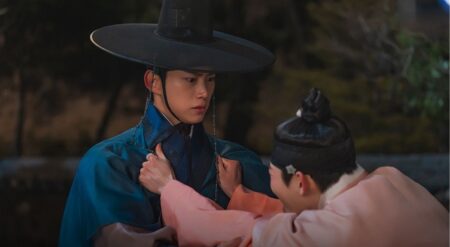Netflix’s The Decameron is a comedy series loosely based on the 14th-century Italian classic set of 100 tales of the same name. A group of Florentine nobles and their staff escape the city to a villa in the countryside at the invitation of its lord Leonardo. Fairly farcical, a touch raunchy, and filled with a dry, British sense of humor, a full retinue of interesting characters keeps this otherwise drawn-out affair entertaining.
The show has a fairly winning formula to start. Several pairs set off for the villa to avoid the plague and retreat from the endless death around them. There’s Filomina (Jessica Plummer), the youngest daughter of a dying nobleman, and her handmaiden, Licisca (Tanya Reynolds). There’s the entitled Pampinea (Zosia Mamet), recently betrothed to Leonardo and her faithful handmaiden Misia (Saoirse-Monica Jackson). There’s the pious Neifile (Lou Gala) and her husband Panfillo (Karan Gill). And then there’s the bumbling Tindaro (Douggie McMeekin) and his hot doctor Dioneo (Amar Chadha-Patel). Caring for the villa and tending to the guests are also Sirisco (Tony Hale) and Stratilia (Leila Farzad).
From the start, the characters are all likable in their own ways. The dynamics between each pair are intriguing. Power, trust, wealth, and attraction are at play even before the 10 main members of the cast descend upon their temporary home. Once they all arrive, everything is fair game. Alliances shift, friendships and romances form, and many a self-discovery is made. Carnal desires and violent defenses of the villa make up the majority of the action and drama. However, between some of the tenser moments are introspection and deeper discussion.

The Decameron’s main setback is that it’s too long. The same scenarios feel like they start repeating a few times too many as the episodes draw on. While each episode has its own character progression or changes to the group dynamic, there are still a number of moments that are indistinguishable from one another between episodes, usually involving home invasion and graphic violence. The jokes around these segments grow old after the first time, really.
The jokes are an acquired taste as it is. The best way to describe the show’s sense of humor is simple: “British.” It is so incredibly dry. It works wonderfully in short bursts, but repeating the same scenarios or types of situations too many times leaves the comedy unsuccessful after a while.
By the end of the show, it almost drops its sense of humor entirely in exchange for pure drama and action. Not a poor or positive choice necessarily, just a noticeable swing in tone after so many hours of the same droll and only one American jester-type in Tony Hale. He sticks out sharply in a way that brings great fun until he becomes a tad annoying by the conclusion of the series.
Where The Decameron shines is in its individual relationships. The group dynamic is always interesting. These characters are so distinct from one another that every interaction in groups, large or small, sows some kind of chaos. But any time two characters are working through their relationship is always interesting. Whether they’ve known each other their whole lives, they’re manipulating one another to grab at power, or they just got the hots for each other yesterday, every pairing and repairing of the ten characters works great.

The show also delights in some queer elements, which is nice for a period piece. It would have been nice if it delighted just a little more, but this is true of many of the relationships. While they’re all strong, many of them either peter out or are cut off and forgotten about for one reason or another. One character’s death, in particular, feels like it comes much too early. It completely truncates all of the dynamics they were part of. There’s plenty more that take its place, though, in the rapid fire of fickle, rich people’s whim changes.
The costuming in The Decameron is well-done, and the villa set is nice. It’s vast enough that its many rooms and grounds don’t get repetitive. Its many nooks and crannies are well-used throughout the plot. It’s such a solid set that whenever the show leaves the villa, it’s almost disquieting and out of place. The soundtrack occasionally contains pop songs that don’t feel out of place, per se, but they don’t always feel quite right, either. Perhaps because they are so few and far between, and none of the songs are recognizable.
The Decameron isn’t particularly profound about its morality topics. It’s also a little too repetitive and maybe not raunchy enough for a show about a bunch of hot people trapped in a villa together during the plague. But its colorful characters constantly keep things interesting, and the group and pair dynamics are consistently entertaining.
The Decameron is streaming now exclusively on Netflix.
The Decameron
-
Rating - 6.5/106.5/10
TL;DR
The Decameron isn’t particularly profound about its morality topics. It’s also a little too repetitive and maybe not raunchy enough for a show about a bunch of hot people trapped in a villa together during the plague.







